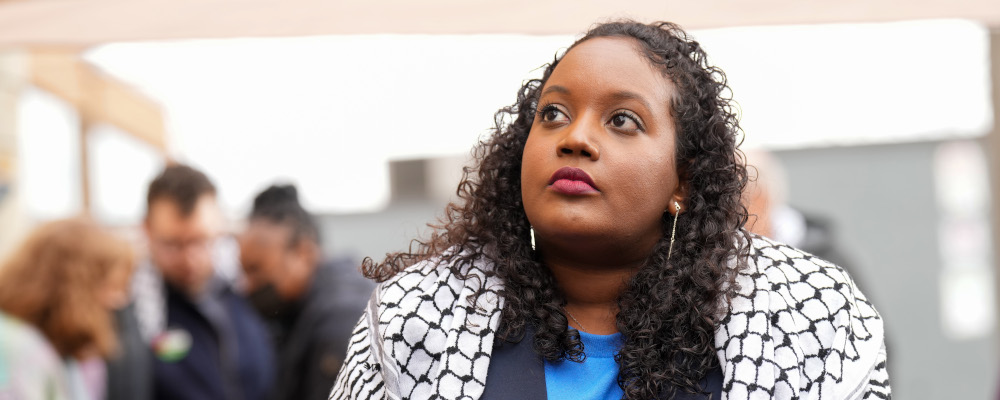There is a showdown brewing in Ontario’s provincial parliament. The battle may be over a small piece of patterned cloth, but the principles at play are grand: free expression, cultural rights, and, most importantly, whether our relentless partisan divide leaves any room for reasoned political debate.
To recap, in mid-April, amid the Israel-Hamas war, Queen’s Park speaker Ted Arnott decided to ban the keffiyeh, the traditional patterned headdress worn by Arab people across the Middle East, from the Ontario legislature. Premier Doug Ford and the other party leaders all opposed the ban, but the effort to overturn the speaker’s order failed when a Progressive Conservative MPP refused to vote in favour of the unanimous consent motion. Days later, a second such motion failed again. And late last week, independent MPP Sarah Jama (previously of the NDP before being expelled from that caucus for her anti-Israel statements immediately after October 7th) was banned from the chamber for her refusal to remove the keffiyeh. The Ontario NDP leader, Marit Stiles, now says that if the premier does not push for a reversal of the keffiyeh ban, the NDP caucus will defy the rules.
While the politicking plays out in Queen’s Park, the culture warriors have taken to their usual corners and have begun to make the expected arguments.
Speaker Arnott reached his decision on the basis that “members’ attire” bearing “ logos, symbols, slogans, and other political messaging are not permitted,” a ban that has a long history in Ontario’s legislature. Naturally, those opposed to his decision then attempted to frame the keffiyeh as something other than political.

The federal Justice Minister Arif Virani took to X soon after the speaker’s decision and wrote “the [keffiyeh] is an important cultural symbol” and that wearing it indicates “pride in one’s heritage.” Former Amnesty International Canada president Alex Neve called the cloth an “iconic embodiment of Palestinian culture and identity,” thus emphasizing its cultural role. And Stiles linked the ban to “anti-Palestinian racism, hate, and division.”
The problem with this position is that it rings patently false to anyone with eyes, ears, and a cursory understanding of symbols. It is hard to deny that the explosion in the wearing of keffiyehs in North America in recent months correlates directly with growing anti-Israel protests. And the symbol is not being solely worn by those of Palestinian or Arab descent. (Just do a simple Google image search to see how many non-Arab students on campus encampments are sporting the keffiyeh.) Whatever its meaning at other times in history, wearing the keffiyeh in 2024 in Canada is not like wearing a lederhosen or a sari.
In fact, those taking this absurd position themselves subtly (and sometimes not so subtly) concede the point. Neve, for example, writes that the Queen’s Park ban was put in place because the keffiyeh has become meaningful “to millions and millions of people in the desperate struggle to stand up for the survival of the Palestinian people and their culture.” You may agree or disagree with him that the survival of Palestinians and their culture is at stake, but “the desperate struggle to stand up” for those things sure sounds like a political endeavour. Jama drops the pretense altogether, saying “This is a political issue, my job is to be political, and so I will continue to wear this garment.”
The other side of the debate, too, engages in discourse that gives off more heat than light. In a piece that represents much of the anti-keffiyeh position, Rahim Mohamed writes in the National Post that the kaffiyeh has an “unshakable association with Palestinian political violence,” suggesting that the “fishnet pattern scarf favoured by protesters is synonymous with militant Palestinian leader Yasser Arafat.”
This argument is overwrought. Whatever the keffiyeh’s political meaning, it is not solely a political symbol. While it may not be the purely cultural symbol Minister Virani and others claim, it has a strong cultural component. Worn for practical reasons by Bedouins, the wearing of it predates the Palestine-Israel conflict which arose in the early part of the 20th century. And, surely, it has political and cultural associations beyond violence and Arafat. It was, for example, a symbol of the Palestinian working class in the 1800s who preferred it to the brimless Ottoman fez favoured by the upper class.
But the key error in Mohamed’s argument is that, in trying to score a point, he subtly concedes something critical: that the problem with the keffiyeh in the legislature isn’t that it promotes bad politics, but any politics at all.
The more principled reason to oppose the keffiyeh in the legislature is that in a liberal democratic society, our deliberative institutions should strive for more reasoned, civil debate. The introduction of signs and symbols in our law-making institutions diminishes and coarsens the public discourse at precisely the moment we can least afford it.
Regrettably, the space for reasoned debate in our society is shrinking alongside the space for non-political civic life. Every realm of public life is now infused with tribal political symbols. It is to our great detriment, and a sign of the ill health of our polity, that all things, from our beer and chicken sandwiches to the sports and comedy we watch, have become political battlegrounds.
In this climate, it is all more important that we preserve institutions that foster articulate, respectful, pluralistic political debate.

The institutions designed for this purpose have been weakened lately. Our universities, for example, have increasingly taken on institutional political positions, undermining their role as a forum for rigorous intellectual inquiry. Our public broadcaster is increasingly seen by the Canadian public as having a clear ideological bias. Even the office of the governor general has not been spared, having recently hosted an event that critics allege promoted the Trudeau government’s controversial Online Harms Bill.
The legislature holds a unique place in our polity and should aspire to more. While it should serve as the forum for political disagreement and debate, it should not itself be seen as partisan. And it should elevate our public discourse, instead of becoming yet another force that reduces nuanced topics to signs, pins, stickers, and placards.
Opposing the keffiyeh for its alleged bad meaning naturally draws out the battle over that meaning, and invites another battle over the freedom of expression. It also invites future fights about the meaning of every other symbol that MPPs will hereinafter try to bring into the legislature. Is the Ukraine pin a good or bad symbol? The Black Lives Matter badge? What about the MAGA hat? Open this door just a little and we will be mired in a thousand battles about a thousand causes, logos, and signs.
The solution, then, is not to engage in a futile line-drawing exercise which will leave many stakeholders unhappy much of the time. Instead, it is to maintain the existing nearly blanket ban on political symbols. (I say “nearly blanket” because symbols like the Remembrance Day poppy are now permitted at Queen’s Park. But even that required a special exemption.) The ban avoids the problem altogether, allowing our core deliberative body to remain a place for reason above passion.
We will likely never agree on the precise meaning of the keffiyeh (though we should at least strive to be honest in its interpretation; something the “it’s just a cultural symbol” crowd is not doing.)
But we should agree that some corners of our society should be reserved for deliberation and debate instead of cheap appeals to emotion and tribalism. What better place for that than Queen’s Park?
Recommended for You
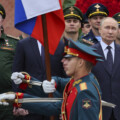
‘Putin has no intention of stopping this war’: Sir Bill Browder on three years of war in Ukraine and how Russia is evading sanctions
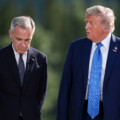
The Notebook by Theo Argitis: Trump halts trade talks, Carney’s trade-offs and John McCallum’s legacy
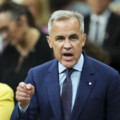
The Weekly Wrap: The Liberals must abandon their internet regulation agenda
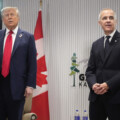
‘A direct attack’: The Roundtable on Trump’s surprise trade announcement and Canada’s immigration debacle

